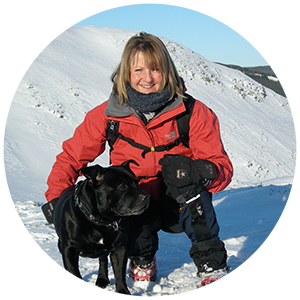“I woke up in the middle of the night thinking that there was something electrical going off in the room. I woke my husband and asked if he could here the buzzing, whistling noise but he couldn’t and that’s when I realised it was in my head.”
It was May 13th 2013, and I woke up in the middle of the night thinking that there was something electrical going off in the room. I woke my husband and asked if he could hear the buzzing, whistling noise but he couldn’t and that’s when I realised it was in my head. The sound was only in one ear and as I go swimming a lot, I thought it must be an ear infection that was causing it.
I went to my GP and had my ear checked out and he said there was no infection and that’s when I started to be concerned that I was going to be stuck with this noise. My GP then referred me to the local NHS Hospital where I had a hearing test that concluded I had nothing wrong with my ears.
I went away and did some research and wasn’t too concerned because I had read that sometimes it can just go away as suddenly as it comes. But then I had to call the hospital again a couple of weeks later as it started in my right ear too. I asked the doctor if there were any therapies available to treat it and he flatly said no. He said there was nothing I could do, no therapies and no clinics I could go to. I have worked for the NHS myself, I know they are overstretched and can’t afford the research so if they can’t see something physical to fix then there is no money for it.
“I asked the doctor if there were any therapies available to treat it and he flatly said no. He said there was nothing I could do, no therapies and no clinics I could go to.”
At this point my anxiety levels were going through the roof. The noise had got worse and it was a loud whistling in one ear like a very high pitched whistling kettle. I could hear it all of the time even over road traffic noise and in the supermarket. I hated going to places like the supermarket because I felt as if I was becoming more sensitive to noise. I found that the refrigerator and the air conditioning drove me mad. Most people don’t realise how noisy the supermarket is until something goes wrong with their hearing. Also watching the TV became a nightmare because this also made it worse. It was starting to drive me crazy, I was only sleeping for the odd hour at night. So I went to the doctor to get some sleeping pills.
I suffered from it for seven months thinking it might go, it might get better, I might find something to cure it.
Going on holiday and relaxing made it slightly better but I would go to bed at night and it would come back. In the morning I could forget about it for a short time but as the day went on it would seem to crank up. I think I would have found it difficult working at my last job using a computer and trying to concentrate on spreadsheets. I was glad I was retired.
For 3 or 4 months I struggled really badly with no sleep and I was going to bed later just to tire myself out so I could sleep. I was tossing and turning all night trying to get the volume of whatever I was listening to to drown out the tinnitus. I would drop off but within an hour I would wake up and hear the sound again which would keep me up again for a couple of hours. This was the worst impact on my life, not being able to sleep. I said to my husband “if I could just sleep, I could learn to live with it”. I am quite sporty and I love running and swimming, but my energy levels were so low at that time I just couldn’t do anything.
I hid it from a lot of people in my life. I didn’t want people to ask me how my ears were every time I saw them, so I didn’t tell my family or friends. I thought if they knew it would just make it worse.
The trigger to get professional help came when my dog died in November, I know emotional times can make it worse, and at that point it just got worse.
I had tried everything I could to make it better but nothing had worked.
“I read about a patient who said The Tinnitus Clinic had helped him. Seeing those words made me feel as though someone knows what it is like and this definitely helped me to seek help.”
Then I discovered The Tinnitus Clinic and read about other patient’s experiences with tinnitus. I read one of the patient stories and someone had said that they felt as though they couldn’t go on and I thought “yes, I feel like that too”. I didn’t want to go out or do anything. The patient said The Tinnitus Clinic had helped him. Seeing those words made me feel as though someone knows what it is like and this definitely helped me to seek help. So I went to The Tinnitus Clinic at the end of November 2013.”
Mike Wells describes Josie’s condition. “Josie presented in clinic with bilateral tinnitus. The perceptions were different on each side – a ringing in the right ear and a hissing sound on the left.
Diagnostic tests including hearing tests indicated generally normal auditory function with no clear tinnitus pathology. One of the tests completed during the initial assessment is called a ‘residual inhibition test’. This procedure provides an indication of whether sound-based therapies are likely to provide relief to a patient suffering with tinnitus. In Josie’s case there was a positive response to this test and so it was decided that the most clinically appropriate way to treat the condition was by commencing Tinnitus Desensitisation Therapy.
The timescale for this treatment varies from patient to patient but is usually between six and twelve months. Each subsequent follow-up appointment showed a gradual improvement in Josie’s tinnitus perception to the point where she now finds it much less invasive or noticeable on a day-to-day basis. This is the outcome that we hoped to achieve.”
Josie continues. “After the initial assessment I immediately thought, yes, I will go with the Tinnitus Desensitisation Therapy. The audiologist said that there was a slight hearing loss in one ear, but there was nothing seriously wrong with my hearing. He was very professional and gave me confidence that the chosen treatment could work.
The sound that was generated by the tinnitus ear pieces was kept quite low but loud enough to hear it, it almost sounded like being near a waterfall. It was a very pleasant noise compared to the noise that was in my head. I was using the devices for about 3 hours a day and within 3 weeks I noticed that I was sleeping a lot better, honestly it was that quick I couldn’t believe it.
About 3 months into the treatment I was really pleased and felt that it was working. At first it was three hours a day and then gradually over the 9 months I was wearing them up to 6 or 7 hours a day. When I took them out there would be no tinnitus noise, gradually it would come back. However, the longer I used the devices the whistling sound would became less and less noticeable. The volume of my tinnitus decreased and it was nowhere near as annoying as it previously was.
After the 10 months of treatment that ended in October, Mike Wells the audiologist told me to try two weeks without the devices and I was a bit hesitant as I had come to rely on them to give me a break. I gave it a go and I was fine. My tinnitus didn’t get any worse. I could still hear it a little bit, but it wasn’t annoying. That was last October 2014 and I haven’t felt the need to put them back in since!
Everyday noises drown out the sound now and I can’t hear it at all, except if I am in a really quiet place.
The pitch has remained the same but it’s so much quieter and not as obvious. I fall asleep really quickly now and wake up normally. I feel like I have got my energy back and can concentrate again. I am now able to enjoy sport again and keeping fit.
I would say that if you have the chance then try the treatment because it has worked for me and I would never have believed it when I was given the devices.
My whole personality is back to where it was and now I can get on with my life.
“I would say that if you have the chance then try the treatment because it has worked for me and I would never have believed it when I was given the devices. My whole personality is back to where it was and now I can get on with my life.”


